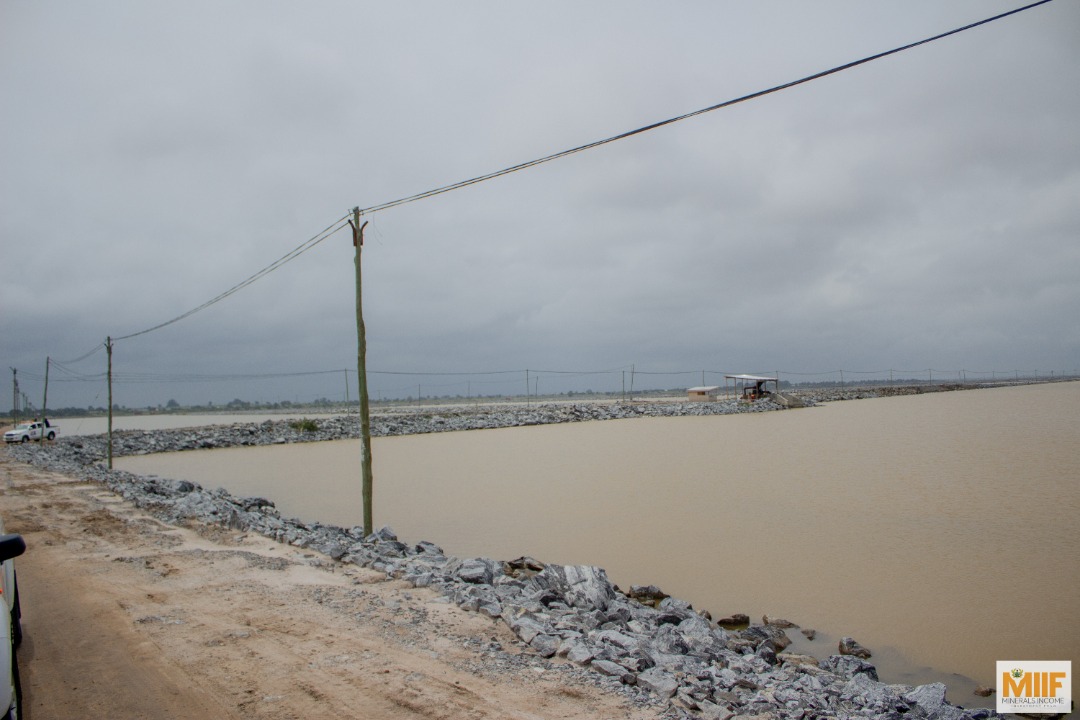
Minerals Fund to invest in industrial salt sector
The Minerals Income Investment Fund (MIIF) has classified salt as a high priority mineral.
Other minerals classified as high priority are lithium, limestone, granite and diamond.
Advertisement
The fund, which has the mandate to maximise the value of dividend and royalties from the country’s mineral resources, is completing a strategy on the high priority minerals to attract investments into the sector to boost value and job creation.
“Classifying salt as a high priority mineral means we will invest in the mineral value chain development; we will de-risk its funding methods and help with the acquisition of relevant technology that revitalises the industry,” the Chief Executive Officer of MIIF, Edward Nana Yaw Koranteng, said.
After a one-day working visit to the Electrochem Salt Production site at Ada Songhor, he said the fund was also positioning itself to invest in the industrial salt sector, in line with its mineral investment diversification strategy.
Top earner
Mr Koranteng expressed optimism that the planned focus on the mineral would generate a new economic vibrancy for the areas known for salt production, such as Ada, Sege, Keta, Ningo and Winneba.
He said the plan of MIIF to strategically focus on salt would make the sector become one of the country’s major foreign exchange earners by 2026 and a top industrial earner by 2030, especially if the resuscitation plan of the Ada Songhor Salt project followed through as planned.
“The plan to boost salt production and the development of its allied value chain should yield about $2 billion to the Ghanaian economy, beginning 2027, with the potential to create more than 10,000 direct and indirect jobs in the next five years from just the Songhor Salt pan alone,” he said.
He indicated that Ghana and Senegal were the only countries in West Africa with the potential for large-scale industrial salt production.
He decried the fact that Nigeria, with a salt demand in excess of 1.5 million tonnes per annum, imported eight per cent of its industrial salt needs from Brazil, while the Songhor salt pans alone had the capacity to produce over a million tonnes at just 60 per cent capacity.

Global salt market
Salt has at least 14,000 uses, with the chemical industry most reliant on the mineral to produce various chemicals.
It is frequently used as a raw material in the production of chlorine, caustic soda and soda ash. Aside from these, industrial salt is used to make sodium sulphate, sodium carbonate, hydrochloric acid, sodium bicarbonate, liquid sodium, metallic sodium and sodium nitrate.
Salt is also used for detergents, de-icing, textiles and fertiliser and is used heavily in oil and gas processing.
The 270 million tonnes of salt produced worldwide in 2020 was valued at around $28.5 billion.
The MIIF said the market was projected to grow to $36 billion by 2026, with China controlling 22.48 per cent of the world’s production.
Africa’s leading salt producing countries are Egypt, Tunisia, Namibia, Morocco and South Africa.
Production in Ghana, according to the MIIF, had remained relatively flat at 250,000 tonnes since 2013.
The Ada Songhor Salt Resuscitation Project
The Ada Songhor Pans, a 41,000-acre salt project, is currently being resuscitated by Electrochem, a fully owned Ghanaian company.
The acreage of the Ada Songhor Project made it the largest in Africa, the MIIF said.
The concession spreads through several communities, including Sege, Ada Foah and Big Ada.
“It has been lying dormant as an industrial salt producing area since 1982, with potential to produce more than 1.75 million tonnes and go on to become the largest salt producing area in Africa," the MIIF stated.
The resuscitation project by Electrochem, which started in late 2016, with initial production starting in early 2021, has led to the full restoration of the Songhor Lagoon, which had dried out for eight years.
The project currently creates employment for 2,800 people, both directly and indirectly.
Electrochem, a subsidiary of the McDan Group of Companies, has developed a community salt mining scheme, of which the company is the offtaker.
Although current production is just about 12 per cent of capacity, the redevelopment has garnered interest from the sub-region and led to the first-ever sea export of salt from Ghana through the Tema Port.
MIIF Initiative with Ada Songhor Salt
Mr Koranteng said the MIIF would partner and support the full restoration of the Ada Salt project to its full capacity with an equity investment.
“The place was completely dead; the lagoon had dried up, the ponds were heavily silted and the project previously looked like a high risk or a death knell for any investor to engage in, especially with factions among the chiefs and people of the various communities. It was considered in financial circles as a poisoned chalice for anybody to take on,” he said.
He said Electrochem seemed to have succeeded in reducing the daunting task into manageable pieces.
Factionalism
The Chairman of Electrochem, Daniel McKorley, told the MIIF team how happy the company was that the community was now united behind the project.
“We realised the problem of factionalism the moment we conceived the project. We worked on uniting the community and seeking their support and that of the chiefs for more than two years before moving to site; we needed to get it right with the community,” he stated.
Mr McKorley said the company was creating a wealthy ecosystem that fed the community first and then the business.
“Remember, salt production is primarily from the sea, and as long as the sea never dries, the community and the business will both progress,” he said.




